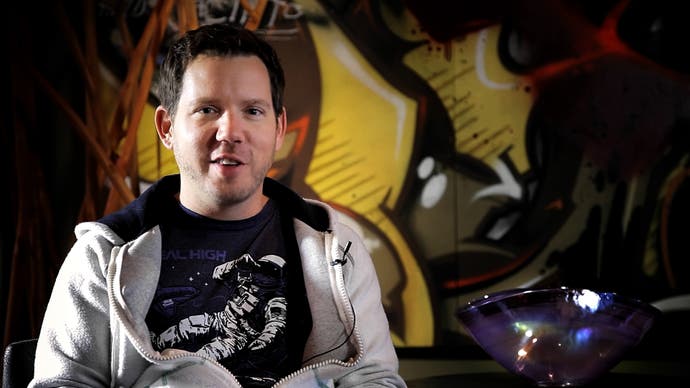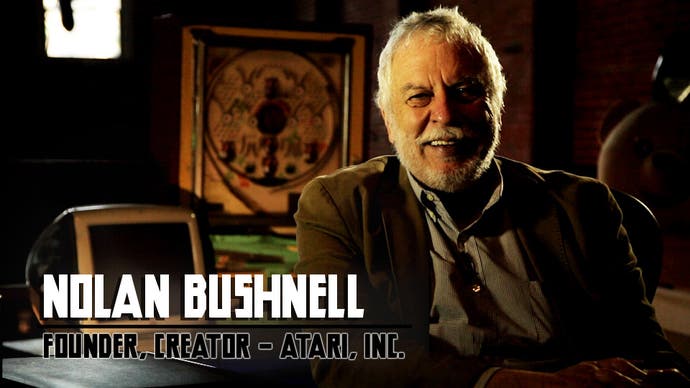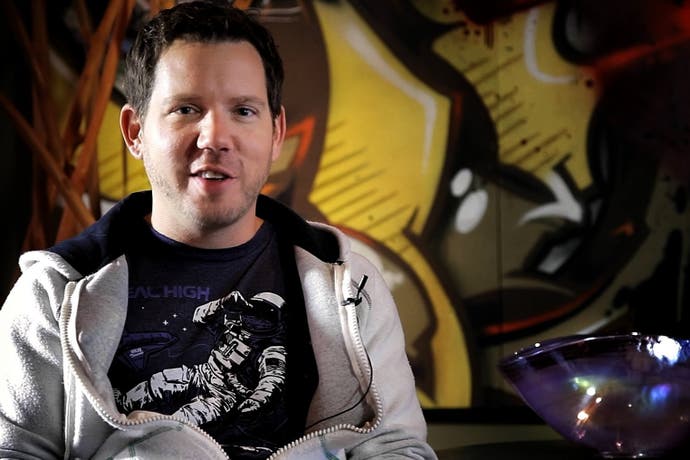Video Games: The Movie review
A star-studded crowdfunded documentary makes a poor case for gaming's cultural legitimacy.
Who remembers that classic documentary, Music: The Movie? Or Books: The Movie, and it's rather meta follow-up, Movies: The Movie? They don't exist, of course, because those are such broad concepts that the idea of encapsulating them in a single 90 minute film is madness. Instead, documentary makers covering those media wisely focus on specific periods, genres, or tell the story of unique creations and the innovators who brought them to life.
Videogames: The Movie doesn't do that. It's so eager to tell you how goshdarned awesome videogames are that it tries to fit everything in. It's an impossible task, and the result is a film that misses too much out, and offers only shallow coverage of the material it can make room for.
It opens with a 30 minute sprint through the entire history of gaming, from Spacewar in the 1960s through to today's state-of-the-art consoles. This is all visualised using a whizzy 3D graphic of a timeline that we zoom up and down, yet because of the sheer scale of the subject that must be covered, the camera can never alight at any particular point for very long.
The film rattles from Pong and Space Invaders to Mario and then before you know it, they're talking about Tomb Raider and beyond. It's a blur. There are talking head interviews with a variety of familiar faces, but none add any real context or insight. Former Goonie and Hobbit Sean Astin narrates while famous gamers such as Wil Wheaton, Zach Braff and Max Landis recall their early gaming memories, as do well known industry faces like Cliffy B and Dave Perry. Hideo Kojima and Peter Molyneux turn up a few times. Nolan Bushnell is rolled out whenever they need someone to talk about the really olden days.
There's just no shape to the movie around which all this talk can coalesce. After reaching the end of the timeline, the film rewinds to the industry crash of 1983 and the E.T. game that precipitated it. This too is hurried past in a few minutes and a handful of soundbites. The film leaps from the post-crash popularity of Nintendo and Mario to the arrival of Doom, and then gets sidetracked into a section about multiplayer gaming. It's like having someone skim through Wikipedia entries and follow every hyperlink they come across rather than reading to the end. These early interview sections never dig much deeper than "Hey, remember when we used to do this?" nostalgia, and the rest is bulked out with montage.
My goodness, this film loves montage. It sometimes seems that it can't go for more than a few minutes without making room for another selection of clips from old games, stock photos, old TV ads and archive news footage. It's a standard tool in the documentary maker's arsenal, but it gets wielded too often and too heavily here. Occasionally, the material chosen is literally out of place. During an introductory montage about the rise of Atari, there are repeated inexplicable shots of Bally Midway's Ms. Pac-Man arcade cabinet.
The film's voice is evangelical, to a distracting degree. The opening section feels like a pitch video aimed at getting 1990s venture capitalists to invest in games, right down to a barrage of statistics at the start about the demographics of gamers. Did you know females play games? It's true! The rest of the movie has the messianic tone of a cult indoctrination video. The glassy-eyed GAMES ARE GOOD message is so relentless and so devoid of contrast that, I swear, if you swapped the word "games" for the word "Xenu", you'd have a pretty good Scientology recruitment film.
No extreme is considered too pretentious in pursuit of making games look important. The film opens with a quote from none other than Mahatma Gandhi. Later on, quotes from Nikola Tesla and JFK are also used to introduce people talking about big topics like Mario and shoot-em-ups and virtual reality. There's a persistent defensive tone, a sense that the film is forever addressing a skeptical disapproving parent who doesn't understand what games are. It protests too much and ends up making extravagant claims about gaming's importance that are ultimately unhelpful.
As such, there's no texture. No conflicting opinions, no debate or discussion of any kind. Just a parade of things related to games, all of which are amazing and awesome. Violence in games is acknowledged but hurriedly batted aside using valid but overly familiar and slightly facile arguments. We learn that games can make sick people feel better, and foster nurturing communities, but there's no mention of the toxicity that blights so many online games. We're informed that children are the future, because of their limitless imagination, and did you know games can be educational too? They can!
It's all so achingly trite. At one point, it's even claimed that games have "changed the course of human evolution" because people meet in MMOs or through other online games and go on to get married. People have been using the back row of the cinema as a mating ritual for over half a century, but I've yet to see a film scholar claiming that movies have shaped our genetic destiny as a result.

The film's other major failing is that despite its all-encompassing title, it has a very narrow view of what games are and can be. It positions the big US-led blockbuster narrative games model as the one true evolution of the medium, and the pinnacle to which everything has been inexorably building, rather than one design ethos among many that just happens to be currently in vogue.
There is, disappointingly, virtually no discussion of gameplay mechanics or how designers ply their trade, but there are endless references to storytelling, character and immersion. It even trots out the terrible old cliché of the campfire storyteller, and suggests games are the futuristic inheritor of that iconic mantle. If you can hold back the vomit when Astin solemnly intones that, in gaming, "the campfire is just a bit brighter and more colourful" then you have a stronger stomach than me. That Gears of War is held up as one such shining example, making gamer's cry with the saga of Dom's mummified wife, only underlines the lunacy of this blinkered definition.
The overall tone is not overtly dismissive of the early arcade games, but the implication is that those games are by definition obsolete and inferior, because they didn't tell stories. They didn't have characters. They weren't movies you could play. The fact that they feature inspired, simple gameplay loops that are still amazing today doesn't even register. That's not what makes games into art. All roads lead to today's groaning mega-franchises, and those franchises are art because just look at all the people working on them and look how much like a movie the end result is.
For all its talk of gaming being a rich and varied medium of the future, it so often defaults to the bombastic mainstream American action game as the gold standard that it undermines even its own vague point. It's like using The Fast and the Furious to illustrate how important, meaningful and expressive cinema can be.
Admittedly, the film does finally acknowledge the indie scene, right before the end, but it gets treated with much the same surface gloss as everything else. Indie game designers can risk more quirky ideas because they're smaller than the giant studios, you see. This jaw-dropping revelation is all you get. No specific indie titles are named or explored, and the subsequent indie montage includes footage of somebody creating a 3D model of Juggernaut for an X-Men game, for some reason.

I honestly have no idea who the audience for this film is. If you're reading this site, you already know everything that the film covers, and in greater depth. Yet if the film is aimed at non-gamers, as its messianic approach suggests, then it serves both them and games poorly by offering such a one-note cheerleading routine. You need too much existing knowledge to understand what's being said - Steam is referenced multiple times, for example, but is never explained - and yet if you have that knowledge, the film is redundant. As a history lesson, it's too shallow. As an editorial piece, it's too unfocused.
It's hard not to compare it to Charlie Brooker's similarly themed How Videogames Changed The World, which succeeded mostly because it actually covered specific games in reasonable depth, put them in useful context and wasn't afraid to acknowledge that its title was heartfelt but also knowingly over the top. There was intelligence, humour and modesty - adult stuff like that. Videogames: The Movie, by comparison, is like being cornered by an earnest fanboy who won't shut up until you accept that games are the ultimate artform because oh my god don't you understand it's interactive.
Video Games: The Movie is, fundamentally, a weak film, of interest only to gamers who want their lifestyle choice validated, lionised and reflected back at them. It has no meaningful structure or shape, no coherent argument to make and, ironically for something that seems to hold narrative as the highest peak games can aspire to, it has no worthwhile story to tell.
I love games. I even agree with the general point that I think filmmaker Jeremy Snead is trying to make: that games will be, and in many cases already are, the most exciting medium of the 21st century. But for games to have cultural legitimacy, they don't need this sort of broad strokes Dummies Guide approach, seeking to gain approval from the wider culture by making a pleading scattershot case for why games matter. We're past that point, and hammering on about why people should care about our hobby ultimately has the opposite effect.
We need measured, passionate adult debate. We need to acknowledge the weaknesses of gaming and discuss ways it can improve. We need to celebrate the successes without falling into fawning "everything is awesome" internet hyperbole. Most of all, we need to trust that there's universal meaning in the smaller details of gaming and gaming history, in the specifics and the niches, the macro scale incidents and ideas where true human interest thrives, and have confidence that non-gamers can be drawn to those insights without being lectured and scolded for not taking "geeks" seriously.










